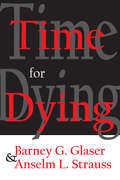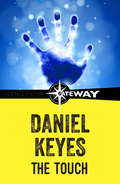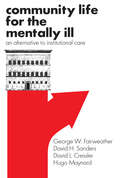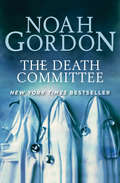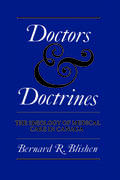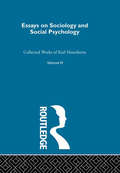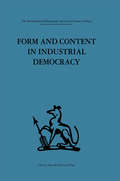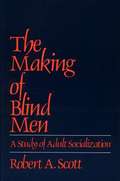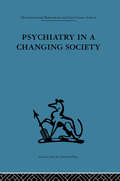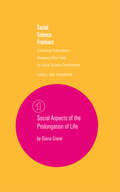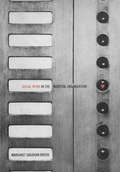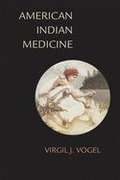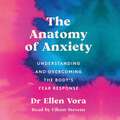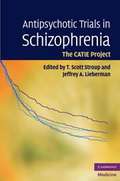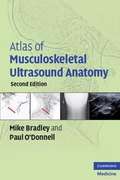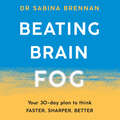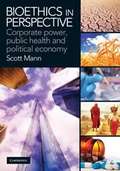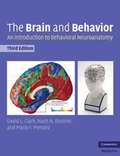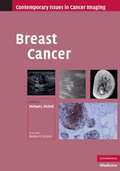- Table View
- List View
Time for Dying
by Graham McAleerThis book has been written for those who must work with and give care to the dying. Our discussion is not simple narrative or description; it is a ""rendition of reality,"" informed by a rather densely woven and fairly abstract theoretical scheme. This scheme evolved gradually during the course of our research. The second audience for this volume is social scientists who are less interested in dying than they are in useful substantive theory. Our central concern is with the temporal aspects of work. The theory presented here may be useful to social scientists interested in areas far removed from health, medicine, or hospitals. The training of physicians and nurses equips them for the technical aspects of dealing with illness.Medical students learn not to kill patients through error, and to save lives through diagnosis and treatment. But their teachers put little or no emphasis on how to talk with dying patients; how-or whether-to disclose an impending death; or even how to approach the subject with the wives, husbands, children, and parents of the dying. Students of nursing are taught how to give nursing care to terminal patients, as well as how to give ""post-mortem care."" But the psychological aspects of dealing with the dying and their families are virtually absent from training. Although physicians and nurses are highly skilled at handling the bodies of terminal patients, their behavior to them otherwise is actually outside the province of professional standards. Much, if not most, nontechnical conduct toward, and in the presence of, dying patients and their families is profoundly influenced by ""common sense"" assumptions, essentially untouched by professional or even rational considerations or by current advancement in social-psychological knowledge. The process of dying in hospitals is much affected by professional training and codes, and by the particular conditions of work generated by hospitals as places of work. A third important consideration in int
The Touch
by Daniel KeyesThe ultimate 'what if' novel, from the million-copy-bestselling author of FLOWERS FOR ALGERNON: 'A masterpiece of poignant brilliance ... heartbreaking' GuardianKaren and Barney Stark should never have married. Childless, uncomfortable and incompatible, their marriage has not been a success, and the lack of a child only makes the tension between them worse. And living their lives to the beat of a fertility clock only adds to the increasingly volatile atmosphere.When an incident at Barney's workplace causes them both to be unknowingly contaminated with radioactive dust, they also become pariahs - in their neighbourhood and with their families. But things are only going to get worse. Karen discovers she is pregnant and as their closest friends become frightened enemies, the dream of becoming parents turns into a nightmare...
Community Life for the Mentally Ill: An Alternative to Institutional Care
by George W. Fairweather David H. Sanders David L. Cressler Hugo Maynard"Community Life for the Mentally Ill" presents a social innovative experiment aimed at providing new and more participating social positions in American society for mental patients. It presents the events that occurred when a courageous group of former chronic mental patients abruptly left a hospital and established their own autonomous sub-society in a large, metropolitan area.In order to complete this experiment, the patients created a small society in the community where discharged patients could live and work. Others evaluated the effects of the newly created society upon the behavior and perceptions of its members, which is also presented here. Both the descriptive and comparative aspects of this study are presented as they occurred in real life. The book is concerned with the medical, economic, sociological, and psychological facets of these former patients' daily lives. The effects of this small society upon the neighborhood and city in which it was located, as well as its effects upon professional persons, are richly explored.Clearly defining a radical departure from standard methods for treating the mentally ill, the authors conclude that such an autonomous society can thrive in the appropriate setting; the ex-patient's chances of employment are increased and the chance of recidivism are reduced; the member's self-esteem is enhanced; treatment costs are greatly reduced; the community adjustment of all members is increased, especially among those who have been hospitalized for a long period. With new guidelines for identifying danger zones in urban settings, this becomes a critical work.
The Death Committee
by Noah GordonAt Suffolk County General Hospital, three brilliant young men are brought together by their ambition and passionate dedication to life. But they work in the shadow of the Death Committee, a formidable hospital tribunal where doctors sit in judgment of their peers, deciding who is to blame when a death could have been prevented. During an unforgettable year of love and fear, failure and victory, the young doctors must face the crucial dramas and triumphs of hospital life.
The Death Committee
by Noah GordonWhat if hospitals and doctors could quietly bury their mistakes? This fascinating, bestselling novel tells you why they can’t. Three young men from different backgrounds have graduated from medical schools and become surgical fellows at a leading teaching hospital in Boston. They learn to become surgeons, to communicate with patients and families, and to be observed and appraised by their peers and professors on daily rounds. And each month—sometimes with dry mouth and rapid pulse—each attends the meeting of the Mortality Conference, known to all as the Death Committee, which examines every patient loss for possible human error, in order to prevent it from happening again. How the Death Committee affects and is affected by the lives, loves, and ambitions of three new doctors is the theme of this intriguing and profoundly moving novel.
Doctors and Doctrines: The Ideology of Medical Care in Canada
by Bernard BlishenThere has been controversy for several years now in Canada over the various developments in insurance for medical care. The Canadian Medical Association is of course concerned with protecting the profession as well as the public: those who believe in a government-sponsored medicare plan claim that the medical profession's reaction is based on self-interest. The debate was intensified by the 1962 medicare dispute in Saskatchewan, the publication in 1964 of the first two volumes of the Report of the Royal Commission on Health Services, and the more recent disagreement between the federal and provincial governments over the issue. Professor Blishen here examines the position of the medical profession in this debate as part of an ideological reaction to a rapidly changing society. The growth of scientific knowledge, demographic change, and shifting social values all have an impact on the medical profession: the doctors' dilemma must be seen against this background.The focus of this analysis throughout is the physician's role: the examples are Canadian but the ideologies and situations involved are relevant to all countries with a similar medical development.
Essays Soc & Social Psych V 6
by Karl MannheimFirst published in 1969. Routledge is an imprint of Taylor & Francis, an informa company.
Form and Content in Industrial Democracy: Some experiences from Norway and other European countries (International Behavioural And Social Sciences Ser. #Vol. 46)
by F E Emery Einar Thorsrud Eric TristTavistock Press was established as a co-operative venture between the Tavistock Institute and Routledge & Kegan Paul (RKP) in the 1950s to produce a series of major contributions across the social sciences. This volume is part of a 2001 reissue of a selection of those important works which have since gone out of print, or are difficult to locate. Published by Routledge, 112 volumes in total are being brought together under the name The International Behavioural and Social Sciences Library: Classics from the Tavistock Press. Reproduced here in facsimile, this volume was originally published in 1969 and is available individually. The collection is also available in a number of themed mini-sets of between 5 and 13 volumes, or as a complete collection.
Let Them Eat Promises: The Politics of Hunger in America
by Nick KotzGround-breaking history on the politics of hunger in the United States. Kolz asks who is hungry, why, and how can this be changed.
The Making Of Blind Men
by Robert A. Scott<P>The disability of blindness is a learned social role. The various attitudes and patterns of behavior that characterize people who are blind are not inherent in their condition but, rather, are acquired through ordinary processes of social learning. The Making of Blind Men is intended as a systematic and integrated overview of the blindness problem in America. <P> Dr. Scott chronicles which aspects of this problem are being dealt with by organizations for the blind and the effectiveness of this intervention system. He details the potential consequences of blind people becoming clients of blindness agencies by pointing out that many of the attitudes, behavior patterns, and qualities of character that have been assumed to be given to blind people by their condition are, in fact, products of socialization. As the self-concepts of blind men are generated by the same processes of socialization that shape us all, <P>Dr. Scott puts forth the challenge of reforming the organized intervention system by critically evaluating the validity of blindness workers' assumptions about blindness and the blind. It is felt that an enlightened work force can then render the socialization process of the blind into a rational and deliberate force for positive change.
Psychiatry in a Changing Society
by S H Foulkes G Stewart PrinceTavistock Press was established as a co-operative venture between the Tavistock Institute and Routledge & Kegan Paul (RKP) in the 1950s to produce a series of major contributions across the social sciences. This volume is part of a 2001 reissue of a selection of those important works which have since gone out of print, or are difficult to locate. Published by Routledge, 112 volumes in total are being brought together under the name The International Behavioural and Social Sciences Library: Classics from the Tavistock Press. Reproduced here in facsimile, this volume was originally published in 1969 and is available individually. The collection is also available in a number of themed mini-sets of between 5 and 13 volumes, or as a complete collection.
Social Aspects of the Prolongation of Life (Social Science Frontiers)
by Diana CraneA volume of the Russell Sage Foundation's Social Science Frontiers, occasional publications reviewing new fields for social science development. This paper explores the links between the social and biomedical sciences concerning the prolongation and termination of life, with the aim to stimulate scholars, foundations, and government agencies to further study death and dying in American society. DIANA CRANE is associate professor of sociology at the University of Pennsylvania.
Social Work in the Hospital Organization
by Margaret Gaughan BrockThis book was written to fill a need for a basic text about medical social work. The material has specific reference to social work in the hospital organization, but much of it is applicable to social work within the broader context of health care.Any printed material now available on the subject is largely incidental and scattered reference. This book will be of great value to social workers, and to students in hospital administration, medicine, and nursing. It will also be of help to members of hospital boards and to hospital administrators who wish to establish or evaluate a social service department.Beginning with a background in the history of the hospital and social work, the book provides chapters on the role and function of a social service department in a hospital, on the staffing and administration of such a department, on the kinds of activity in which it engages, and on its place in the larger organization of which it is a part.
The Youngest Science: Notes of a Medicine-Watcher
by Lewis ThomasFrom the 1920s when he watched his father, a general practitioner who made house calls and wrote his prescriptions in Latin, to his days in medical school and beyond, Lewis Thomas saw medicine evolve from an art into a sophisticated science.
Adrift: Fieldnotes from Almost-Motherhood
by Miranda Ward'What would it mean to name this place I'm in, to map it? To say: this is the landscape. It looks like this, smells like this, at night these are the sounds that carry on the wind. Almost-motherhood . . .'When Miranda Ward and her husband decided to have a baby, they were young and optimistic. But five years, three miscarriages and one ectopic pregnancy later, she is still dealing with the ongoing aftermath of that decision, and the shadow it's cast over her relationship to her partner, her body and her future. In this searing, lyrical and radically honest memoir, Ward charts her journey through the uncertain landscape of almost-motherhood, asking questions of geography on the most intimate scale. How can we learn to be at home in our own bodies, even when we feel adrift from them? What language do we have for the spaces in between, the periods of wanting and waiting? And how do we maintain hope as we navigate towards an unknown future?
American Indian Medicine (The Civilization of the American Indian #95)
by Virgil J. VogelThe purpose of this book, says the author, is to show the effect of Indian medicinal practices on white civilization. It discusses Indian theories of disease and methods of combating disease and even goes into the question of which diseases were indigenous and which were brought to the Indian by the white man. It also lists Indian drugs that have won acceptance in the Pharmacopeia of the United States and the National Formulary.
The Anatomy of Anxiety: Understanding and Overcoming the Body's Fear Response
by Dr Ellen Vora'A redeeming way to look at the condition, as not merely a burden but ultimately a blessing ... unexpectedly moving ... validating and hopeful' Guardian'An incredible paradigm shift in how we view anxiety' Dr Nicole LePera, author of international bestseller How to Do the WorkAnxiety. It's all in your head, right? Wrong.Psychiatrist Dr Ellen Vora challenges the conventional view of anxiety as a mental disorder, suggesting instead that much of what we call anxiety begins in the body. Rather than our troubled thoughts creating physical symptoms, she argues that many types of anxiety are the result of states of imbalance in our bodies, whether blood sugar crashes, caffeine highs or sleep deprivation.Her clinical observation shows this type of anxiety is far more preventable than we may realise, responding almost immediately to straightforward adjustments to diet and lifestyle.Backed by the latest scientific research and Dr Vora's own clinical work, The Anatomy of Anxiety offers a fresh, much needed look at mental health, offering actionable strategies for managing our moods.She further argues that other forms of anxiety, when listened to and honoured instead of suppressed, can be seen as a course correction to help nudge us back to a more balanced life.In her groundbreaking book, Dr Vora walks beside us through a healing process to reframe our relationship with anxiety, creating a more joyful and fulfilled life.
Antipsychotic Trials in Schizophrenia
by T. Scott Stroup Jeffrey A. LiebermanAntipsychotic medications are a key treatment for schizophrenia, and sales of antipsychotic drugs approach $20 billion per year, with fierce marketing between the makers of the drugs.
Atlas of Musculoskeletal Ultrasound Anatomy
by Mike Bradley Paul O'DonnellAtlas of Musculoskeletal Ultrasound Anatomy provides an essential grounding in normal ultrasound anatomy, enabling the reader to assess whether anatomy is disrupted through injury or disease. The book is structured systematically, with all commonly imaged areas illustrated by high quality ultrasound scans with accompanying concise descriptive text. Features of the second edition: · Over 100 individual anatomical descriptions · Numerous new images from the latest generation ultrasound machines · Improved surface anatomy diagrams indicating limb and probe optimal positions for each area of anatomy · Numerous radiographic anatomical diagrams showing ultrasound probe overlying the anatomical structure for improved visual understanding Atlas of Musculoskeletal Ultrasound Anatomy appeals to a wide range of practitioners who need to visualize the musculoskeletal system to diagnose injuries or locate blood vessels or nerves while undertaking clinical procedures. Radiologists, sonographers, anaesthetists, physiotherapists, rheumatologists, and orthopaedic surgeons will find this an invaluable practical reference.
Beating Brain Fog: Your 30-Day Plan to Think Faster, Sharper, Better
by Dr Sabina Brennan'A brilliant new book.' Good Housekeeping'Replete with research-based tips, this is a valuable resource for anyone wanting to know more about the difficulties of coping with brain fog.' Professor Shane O'Mara, Professor of Experimental Brain Research, Trinity College Dublin'In this fascinating book neuroscientist Dr Sabina Brennan enters into a world so many of us can relate to, yet few dare discuss. A must-read.' Dr Harry Barry, bestselling author of Anxiety and Panic and Emotional Healing'A real game-changer. Finally a book that explains and recognises brain fog and that offers practical tips to deal with something that's very real for a lot of people. Do your brain a favour and read this book.' Dermot Whelan, comedian, television and radio presenter'Sabina Brennan has skilfully translated the neuroscience of brain fog for the general reader. Having experienced brain fog myself, I found this book absolutely fascinating, insightful and really practical.' Sinead Moriarty, bestselling novelist If you complain of brain fog to a medical professional, you're likely to be told that it isn't a recognised condition. But if you mention brain fog to your friends, they'll know exactly what you mean: fuzzy thinking, trouble concentrating, a sense of grasping for the right word, feeling like your brain is somehow slowed down. In truth, brain fog is not a diagnosis in itself, but a sign that things aren't right in your body.In Beating Brain Fog, neuroscientist Dr Sabina Brennan guides us through the science to show how our brains work, and why we might experience confusion and anxiety. She offers tools to help you identify your own cognitive profile, determining the causes of your specific symptoms, and explains the simple strategies that can help you feel like yourself again. With brain fog now identified as one of the long-term effects of Covid-19, there has never been a more timely moment to tackle your symptoms, with Dr Brennan's unique 30-day plan. Beating Brain Fog takes your symptoms seriously, and shows that you don't have to live with them.
Bioethics in Perspective
by Scott MannIn Bioethics in Perspective Scott Mann demonstrates the importance of issues of corporate power, global inequality and sustainability in shaping health outcomes around the world. The text develops a comprehensive ethical and practical critique of the neoliberal economic ideas which have guided policy in the English-speaking world. It explores the consequences of such policies for health and healthcare around the world, in terms of increasing health inequalities, serious food and water shortages, inadequate health care provision and the marketing of dangerous and unnecessary drugs. With clear proposals for political and economic reform to effectively address these problems, Bioethics in Perspective provides an important counterbalance to much conventional commentary on bioethics. It takes readers with little or no prior knowledge of ethics, economics or medicine quickly and easily into advanced debates and discussions about the causes and consequences of health and illness around the world.
The Brain and Behavior
by David L. Clark Nash N. Boutros Mario F. MendezNow in its third edition, The Brain and Behavior continues on its mission to present a simplified and accessible introduction to behavioral neuroanatomy. Human behavior is a direct reflection of the anatomy of the central nervous system, and it is the goal of the behavioral neuroscientist to uncover its neuroanatomical basis. Much of the new content in this edition reflects advances in functional magnetic resonance imaging. The text is presented in a highly structured and organized format to help the reader distinguish between issues of anatomical, behavioral and physiological relevance. Simplified and clear diagrams are provided throughout the chapters to illustrate key points. Case examples are explored to set the neuroanatomy in the context of clinical experience. This will be essential reading for behavioral clinicians including psychiatrists, neuropsychiatrists, neurologists, psychologists and clinical neuroscientists.
Breast Cancer
by Michael Michell Rodney H. Reznek Janet E. HusbandWorldwide, breast cancer is by far the most common cancer amongst women, with an incidence rate more than twice that of colorectal cancer and cervical cancer and about three times that of lung cancer. Whilst screening programmes have improved detection, this disease still places a very high burden on healthcare services worldwide. Over the last two decades, improved public awareness, the implementation of population screening by mammography, and the development of new technology for diagnosis have transformed the care of patients with breast cancer. In this volume, recognized experts discuss key current issues in the diagnosis and management of breast disease. The development and application of new diagnostic techniques is described as well as the use of sophisticated drugs for more effective treatment. Complex contentious topics including risk factors, borderline lesions, professional performance and quality assurance are thoroughly explored by an expert multidisciplinary team.
